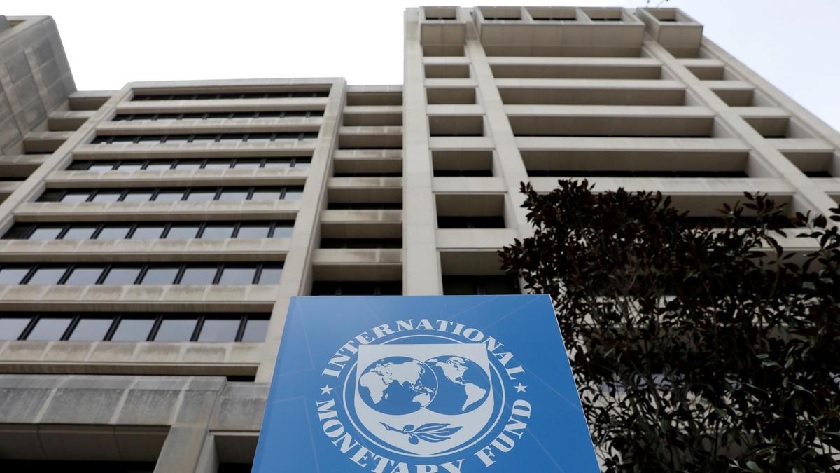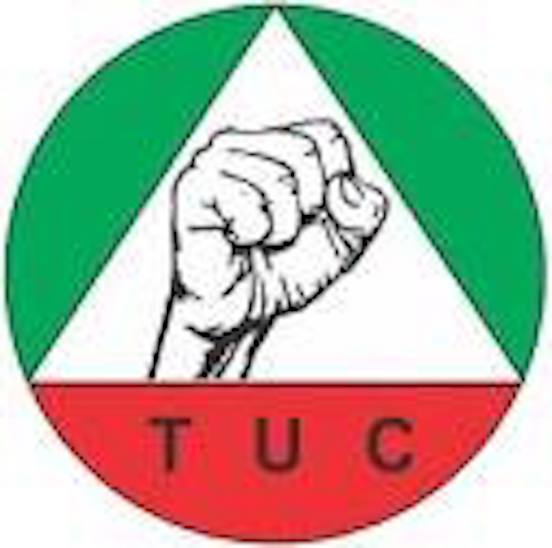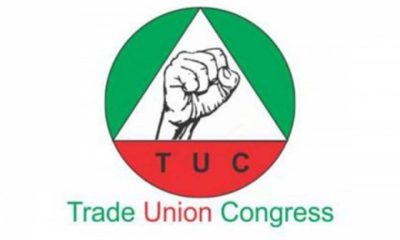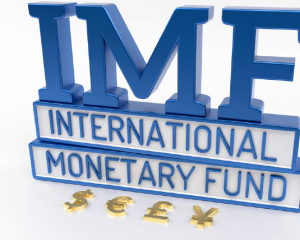Business News
IMF, TUC Analysts Fault Nigeria’s Debt Service Plan

By Mathew Dadiya, Abuja
The International Monetary Fund (IMF), Trade Union Congress (TUC) and other financial analysts have expressed concerns over the plan being put in place by the Nigerian government to service the country’s rising debts.
The Federal Government has plans to borrow about $30 billion and has earmarked N2.
7trillion in the 2020 budget for servicing, which analysts have criticized.The IMF has warned Nigeria over what it described as “a looming debt overhang,” advising that government should scale down the amount spent on debt servicing so as not crowd out other developmental projects.
According to the IMF, “while we do not encourage the government to default indebt servicing, appropriate plans should be put in place to ensure that thedebts are timely serviced. This is why government must broaden the revenue base.”
The Federal government had budgeted N10.33 trillion for the 2020 fiscal year.
With an expected revenue of 8.155trillion, comprising oilrevenue of N2.64trillion, non-oil tax revenues of N1.81trillion and otherrevenues of N3.7trillion. While N2.46trillion was earmarked for capital projects, N2.45 trillion is for debt servicing and another N296billion as sinking fund.
According to the Debt Management Office (DMO), total public debt, comprising the Federal Government of Nigeria (FGN), the 36 states and Federal Capital Territory (FCT) stood at N26.215 trillion as at September2019.
Reacting, National President of TUC, Comrade Olaleye, said that it was regrettable that over 30 percent of the country’s budget for 2020 would be spent on servicing debts.
Comrade Ololeye said that besides the $29.96billion which has gained the approval of the National Assembly, thecountry has so far allegedly borrowed $1billion from African Development Bank;$1billion Eurobond, with additional $500million expected from Global MediumTerm Note Programme.
“How can we use as much as N2.7trillion to service debtand budget a paltry N2.4trillionn on expenditure? It is hard to come to termswith the position of the Information Minister, Mr. Lai Muhammed who toldNigerians that $84 billion loan is nothing to worry about. We are tempted tofeel that politicians are not in tune with the plight of the masses,” he said.
Similarly, both the African Development Bank (AfDB) andthe International Monetary Fund (IMF) both agreed that Nigeria spends a chunkof its revenue on debt servicing.
The AfDB warned that the rapid increase in Nigeria’sexternal indebtedness remain a huge challenge, especially given the shift toward non-concessional external debt.
In addition, it said debt service payments have increasedsince 2010 and are projected to remain high in the medium term, a situation that could heighten the fiscal burden in an already fiscally and growth-constrained environment.
Also reacting, the Head, Department of Banking and Finance,Nasarawa State University, Keffi, Prof. Uche Uwaleke, the huge payment on debt servicing was at the expense of investment in critical infrastructure.
Uwaleke, said, “The implication is that the huge debt service is at theexpense of investment in critical infrastructure. So, the opportunity cost isvery high for the country. The fact that it is crowding out public spending oncompeting development needs is a greatsource of concern.
According to CBN, the external debt service payment stoodat $1.31 billion at the end of November 2019, compared to $1.47 billion spentin the corresponding period of 2018. Nigeria’s external debt profile continuesto snowball and its attendant cost is worrisome.
This means external debt service payment alone rose by245.9per cent between 2015 and 2019 while an accumulated $3.95 billion was paidbetween the periods.
As contained in the budget, the Federal Government budgeted N2.45 trillion to service debt this year. This is just slightly belowN2.78 trillion budgeted for the total capital expenditure.
It should be noted that in the 2020 budget, the overall budget deficit is N2.175 trillion. This means the 2020 budget deficit is largely due to debt service payment as it gulps 23.1per cent of Nigeria’s budget.
It is in recognition of the huge resources being expended on debt servicing that the Federal Government plans to borrow more from foreign sources in order to rebalance the ratio between foreign and domestic debt.
In its Strategic Debt Management Plan 2018 – 2022, the DMO stated that the move towards contracting more foreign loans is to take advantage of cheaper lending rates abroad and a bid to free the local debt market to enable the private sector to access more funds.
Business News
Tinubu Congratulates Dangote on World Bank Appointment

By Jennifer Enuma, Abuja
President Bola Tinubu has congratulated Alhaji Aliko Dangote, the President of Dangote Group, on his appointment to the World Bank’s Private Sector Investment Lab, a body tasked with promoting investment and job creation in emerging economies.
In a statement by Special Adviser on Media and Publicity, Bayo Onanauga, the President described the appointment as apt, given Dangote’s rich private sector experience, strategic investments, and many employment opportunities created through his Dangote Group.
The Dangote Group became one of Africa’s leading conglomerates through innovation and continuous investment.
Dangote Group’s business interests span cement, fertiliser, salt, sugar, oil, and gas. However, the $20 billion Dangote Petroleum Refinery and Petrochemicals remains Africa’s most daring project and most significant single private investment.
“President Tinubu urges Dangote to bring to bear on the World Bank appointment his transformative ideas and initiatives to impact the emerging markets across the world fully” the statement said.

The World Bank announced Dangote’s appointment on Wednesday, as part of a broader expansion of its Private Sector Investment Lab. The lab now enters a new phase aimed at scaling up solutions to attract private capital and create jobs in the developing world.
The CEO of Bayer AG, Bill Anderson, the Chair of Bharti Enterprises, Sunil Bharti Mittal, and the President and CEO of Hyatt Hotels Corporation, Mark Hoplamazian, are on the Private Sector Investment Lab with Dangote.
The World Bank said the expanded membership brings together business leaders with proven track records in generating employment in developing economies, supporting the Bank’s focus on job creation as a central pillar of global development.
Business Analysis
Nigeria Customs Generates over N1.75trn Revenue in 2025
By Joel Oladele, Abuja
The Nigeria Customs Service (NSC) has generated an impressive N1,751,502,252,298.05 in revenue during the first quarter of 2025.
The Comptroller-General (CG) of the Service, Bashir Adeniyi, disclosed this yesterday, during a press briefing in Abuja.
According to Adeniyi, the achievement not only surpasses the quarterly target but also marks a substantial increase compared to the same period last year, reflecting the effectiveness of recent reforms and the dedication of customs officers across the nation.
“This first quarter of 2025 has seen our officers working tirelessly at borders and ports across the nation.
I’m proud to report we’ve made real progress on multiple fronts—from increasing revenue collections to intercepting dangerous shipments,” Adeniyi stated.He attributed this success to the reforms initiated under President Bola Tinubu’s administration and the guidance of the Honourable Minister of Finance and Coordinating Minister of the Economy, Olawale Edun.
The CG noted that the revenue collection for Q1 2025 exceeded the quarterly benchmark of N1,645,000,000,000.00 by N106.5 billion, achieving 106.47% of the target. This performance represents a remarkable 29.96% increase compared to the N1,347,705,251,658.31 collected in Q1 2024.
Adeniyi highlighted the month-by-month growth, noting that January’s collection of N647,880,245,243.67 surpassed its target by 18.12%, while February and March also showed positive trends.
“I’m pleased to report the Service’s revenue collection for Q1 2025 totaled N1,751,502,252,298.05.
“Against our annual target of N6,580,000,000,000.00, the first quarter’s proportional benchmark stood at N1,645,000,000,000.00. I’m proud to announce we’ve exceeded this target by N106.5 billion, achieving 106.47% of our quarterly projection. This outstanding performance represents a substantial 29.96% increase compared to the same period in 2024, where we collected N1,347,705,251,658.31.
“Our month-by-month analysis reveals even more encouraging details of this growth trajectory,” Adeniyi said.
In addition to revenue collection, Adeniyi said the NCS maintained robust anti-smuggling operations, recording 298 seizures with a total Duty Paid Value (DPV) of ₦7,698,557,347.67.
He stated that rice was the most seized commodity, with 135,474 bags intercepted, followed by petroleum products and narcotics.
“From rice to wildlife, these seizures show our targeted approach,” Adeniyi remarked, noting the NCS’s commitment to combating smuggling and protecting national revenue.
Adeniyi also highlighted key initiatives, including the expansion of the B’Odogwu customs clearance platform and the launch of the Authorized Economic Operators Programme, which aims to streamline processes for compliant businesses. The NCS’s Corporate Social Responsibility Programme, “Customs Cares,” was also launched, focusing on education, health, and environmental sustainability.
Despite these achievements, the CG noted that the NCS faced challenges, including exchange rate volatility and non-compliance issues. Adeniyi acknowledged the need for ongoing adaptation and collaboration with stakeholders to address these challenges effectively.
Looking ahead, the NCS aims to continue its modernization efforts and enhance service delivery, ensuring that it remains a critical institution in Nigeria’s economic and security landscape.
“Results speak louder than plans; faster clearances through B’Odogwu, trusted traders in the AEO program, and measurable food price relief from our exemptions. We’ll keep scaling what works,” he concluded.
BUSINESS
NSIA Net Assets Hit N4.35trn in 2024
By Tony Obiechina Abuja
The Nigeria Sovereign Investment Authority (NSIA) yesterday disclosed that its net assets grew from N156bn in 2013 to N4.35 trillion in 2024.
Similarly, the Authority has remained profitable for 12 consecutive years, leading to cumulative retained earnings of N3.
74 trillion in 2024.Managing Director and Chief Executive Officer of NSIA, Aminu Umar- Sadiq made these disclosures at a media engagement in Abuja, highlighting its audited financial results for the 2024 fiscal year.
According to him, the results underscored the resilience of the authority’s investment strategy and the strength of its earnings, driven by a well-diversified revenue base and robust risk management practices, despite a challenging global macroeconomic and geopolitical environment.
Total operating profits, excluding share of profits from associates and Joint Venture (JV) entities, increased from N1.17 trillion in 2023 to N1.86 trillion in 2024, driven by the strong performance of
NSIA’s diversified investment portfolio, infrastructure assets, gains from foreign exchange movements, and derivative valuations.
In addition, Total Comprehensive Income (TCI), inclusive of share of profits from associates and JV entities, reached N1.89 trillion in 2024, reflecting a 59 per cent increase from N1.18 trillion in 2023.
Core TCI (excluding foreign exchange and derivative valuation gains) rose by 148 per cent to N407.9 billion in 2024 compared to N164.7 billion in 2023, supported by robust returns on financial assets measured at fair value through profit and loss, including collateralised securities, private equity, hedge funds, and Exchange-Traded Funds (ETFs).
Umar-Sadiq said the authority’s outstanding financial performance in 2024 reflected the “strength of our strategic vision, disciplined execution and unwavering commitment to sustainable socio-economic advancement.”
He said, “By leveraging innovation, strategic partnerships and sound risk management, we have not only delivered strong returns but also created value for our stakeholders
“As we move forward, we remain focused on driving economic transformation, expanding opportunities, scaling transformative impact and ensuring long-term prosperity for current and future generations of Nigerians.”
The CEO reaffirmed the authority’s commitment to managing the country’s SWF, and delivering the mandates enshrined in the NSIA Act.
He said NSIA remained poised to continually create long-term value for its stakeholders by delivering excellent risk-adjusted financial results, developing a healthy and well-diversified portfolio of assets and large-scale infrastructure projects, and enhancing the desired social outcomes.
He noted that NSIA was committed to its mandate of prudent management and investment of Nigeria’s sovereign wealth.
“In adherence to its Establishment Act, NSIA prioritises transparency, disclosure, and effective communication with all stakeholders and counterparties,” he said.
He pointed out that in the year under review, a new board, led by Olusegun Ogunsanya as Chairman, was appointed by President Bola Tinubu, in accordance with the provisions of the NSIA Act.
The new board will provide strategic direction and oversight, in addition to playing a pivotal role in critical decision making.
He remarked that under the guidance of the Board, the Authority will retain focus on its primary mandate of creating shared value for all stakeholders based on its continued adoption of corporate governance practices.
“NSIA prides itself an investment institution of the federation established to manage funds in excess of budgeted oil revenues and its mission is to play a pivotal role in driving sustained economic development for the benefit of all Nigerians through building a savings base for the Nigerian people, enhancing the development of the county’s infrastructure, and providing stabilisation support in times of economic misadventure,” he added.


























